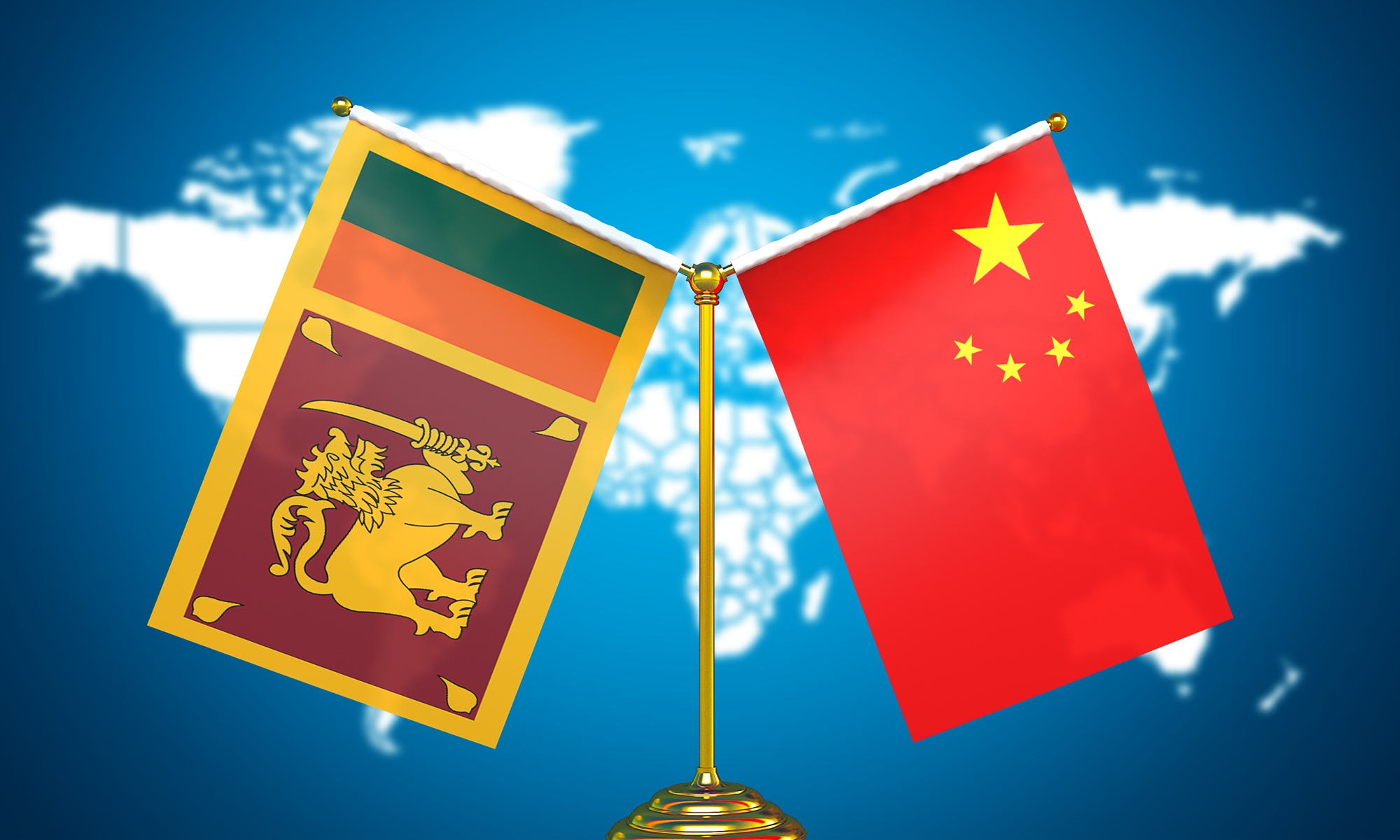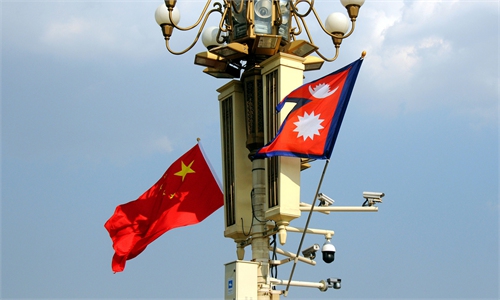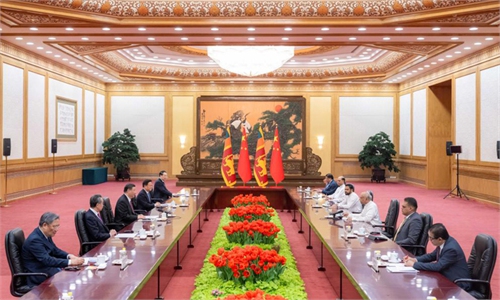
China Sri Lanka Photo:VCG
From March 25 to 30, Sri Lankan Prime Minister Dinesh Gunawardena paid an official visit to China and attended the Boao Forum for Asia 2024 Annual Conference. It is the first official visit by a Sri Lankan leader since President Ranil Wickremesinghe attended the third Belt and Road Forum for International Cooperation in October 2023. The visit to China in six months highlighted the great importance that China and Sri Lanka attach to the development of bilateral relations.During the visit, Chinese President Xi Jinping met with Prime Minister Gunawardena. Premier Li Qiang of the State Council and Chairman of the National People's Congress Standing Committee Zhao Leji also met with him. China and Sri Lanka also issued a joint statement and signed a number of cooperation documents on industrial investment, standardization, livelihood assistance, agriculture, media and other areas, providing new impetus for the stable and positive development of bilateral relations. Traditional friendship, political mutual trust and pragmatic cooperation can be said to be the three key terms of Prime Minister Gunawardena's visit.
The first key term is "traditional friendship." This visit continues the traditional friendship and explains the "original intention" of China-Sri Lanka friendly cooperation. China-Sri Lanka friendship has a long history. The two countries boast a 1,000-year Buddhist bond opened by the eminent monk Faxian, the historical bond of Zheng He's seven ocean voyages and the Rubber-Rice Pact which witnessed "a friend in need is a friend indeed."
In February 1957, China and Sri Lanka formally established diplomatic relations, opening a new chapter in the development of bilateral relations. Since then, no matter how the international situation changes, China and Sri Lanka have always placed each other in an important position in their foreign relations. They have always adhered to the principles of "long-standing friendship, mutual learning, mutual assistance and seeking strength through unity" and have always been committed to promoting the stability and long-term development of bilateral relations.
In 2009, Sri Lanka's civil war ended. Some countries were either non-committal or set harsh conditions on Sri Lanka's request for development aid and loans. However, China provided support without any strings attached, actively participated in Sri Lanka's post-war reconstruction and promptly helped Sri Lanka repair the scars of the war and renew the brilliance of the "Pearl of the Indian Ocean." In 2013, China-Sri Lanka relations were upgraded to a strategic cooperative partnership based on sincere mutual assistance and ever-lasting friendship, marking a new stage of bilateral relations.
In 2014, President Xi Jinping paid a state visit to Sri Lanka. This was the first visit by a Chinese head of state to Sri Lanka in 28 years, elevating bilateral relations to a new height. In 2020, the COVID-19 pandemic broke out suddenly. The then Sri Lankan leader led nearly 1,000 people from all walks of life to pray for China, which became a favorite story in China. The Chinese government also provided Sri Lanka with a large amount of assistance to counter the COVID-19 pandemic.
In 2022, Sri Lanka encountered an economic crisis. China provided emergency humanitarian assistance to Sri Lanka and played an important and active role in the subsequent debt restructuring process, helping Sri Lanka to ease its financial difficulties and achieve debt sustainability, which won high praise from Sri Lanka. As President Xi pointed out to Prime Minister Gunawardena, "consolidating and developing China-Sri Lanka relations is in line with the fundamental interests and common expectations of the two peoples."
The second key term is "political mutual trust." This visit has deepened political mutual trust and consolidated the "cornerstone" of China-Sri Lanka friendly cooperation. China and Sri Lanka have different political systems, economic models, and social cultures. However, the two sides have always been able to examine their bilateral relations from a strategic and overall perspective, always trust each other, work together to resist other countries' interference against our bilateral relations, and always adhere to the Five Principles of Peaceful Coexistence and continuously consolidate political mutual trust. China and Sri Lanka have set a fine example of friendly interactions and mutually beneficial cooperation between countries of different sizes.
Political mutual trust is reflected in respect and support for each other's major core interests. During this visit, the two sides reiterated their support for each other on issues involving each other's core interests and major concerns. President Xi emphasized that China firmly supports Sri Lanka in safeguarding national sovereignty, independence and national dignity. Prime Minister Gunawardena also said that Sri Lanka adheres unswervingly to the one-China principle and unequivocally follows the policy of friendly cooperation with China.
Political mutual trust is reflected in respect and support for each other's political systems and development paths. China has never interfered in Sri Lanka's domestic politics, nor has it added political conditions to aid to Sri Lanka, or put Sri Lanka into the dilemma of "choosing sides." Moreover, China has stressed that the development of China-Sri Lanka relations does not affect the national security of any third party. In this joint statement, China once again promised to continue to "show respect for and support Sri Lanka in independently choosing a development path suited to its national conditions." Sri Lanka also reaffirmed its commitment to an independent nonaligned foreign policy and firm support for and readiness to actively participate in the Global Development Initiative, the Global Security Initiative and the Global Civilization Initiative proposed by China.
Political mutual trust is also reflected in conducting exchanges of experience in governance on the basis of respecting each other's differences. Political mutual trust is not about one country dominating the other, but about "seeking common ground while reserving differences" and "sharing beauty with each other." China has always emphasized that all countries have the autonomy to pursue development paths that suit their own national conditions, and has made great achievements in promoting Chinese-style modernization. Chinese-style modernization breaks the myth of "modernization equals Westernization" and provides a pathway and an action plan for developing countries, including Sri Lanka, to develop on their own. In this regard, Sri Lanka expressed its recognition and admiration.
The third key term is "pragmatic cooperation." This visit has expanded practical cooperation and consolidated the "bond" of China-Sri Lanka friendly cooperation. China is willing to let Sri Lanka share China's development dividend. Sri Lanka is also grateful and appreciates China for its help in Sri Lanka's economic and social development, and hopes that more Chinese enterprises will invest in Sri Lanka to provide support for Sri Lanka's economic transformation and sustainable development. China and Sri Lanka emphasized that they should adhere to equality, mutual benefit and win-win outcomes and commit to building a community with a shared future for Asia and for mankind. This is the meaning of pragmatic cooperation.
This visit reaffirmed our determination to work together to deepen high-quality Belt and Road cooperation. In 2013, Chinese President Xi Jinping formally proposed the initiative to jointly build the 21st Century Maritime Silk Road. Sri Lanka was among the first group of countries to openly support the Chinese initiative, and has hosted flagship projects such as the Colombo Port City and the Hambantota Port integrated development projects. Thus, the China-Sri Lanka cooperation is of great significance for the Belt and Road Initiative.
Some forces that do not want to see China-Sri Lanka friendship concocted all kinds of wrong discourses such as the "debt trap theory," "neo-colonial theory" and "military use of the Hambantota Port," and even coerce and induce the Sri Lankan government to lay aside, back off or even terminate some cooperation projects with China, stirring up the normal advancement of bilateral cooperation.
However, the mainstream of in-depth cooperation between China and Sri Lanka under the framework of the Belt and Road Initiative has not changed and should not be changed. When Sri Lankan President Wickremesinghe visited China in October 2023, the two sides agreed to sign the Memorandum of Understanding on Jointly Accelerating the Formulation of the Cooperation Plan on the Belt and Road Initiative, which was reconfirmed during Prime Minister Gunawardena's visit. In addition, Sri Lanka has also committed to roll out at preferential policies to facilitate the implementation of the Colombo Port City and Hambantota Port integrated development projects, making them signature projects of Belt and Road cooperation between the two countries.
This visit also deepened and expanded the areas of practical cooperation between China and Sri Lanka, especially the proposal to jointly build "a maritime community with a shared future." China and Sri Lanka have reached consensus on cooperation in many aspects such as trade and investment, agricultural development, blue economy, tourism, heritage protection, climate change and people-to-people exchanges, and have proposed some new ideas and measures based on the new situation.
Here are a few examples. In the economic and trade field, in addition to traditional expos, both parties proposed to make good use of "e-commerce platforms," which is consistent with the rapid development of the digital economy. In the maritime field, the two parties expanded the content of cooperation and expressed the desire to build "a maritime community with a shared future." The two sides also agreed to hold periodical bilateral consultations on maritime affairs, which will be conducive to bilateral communication and the development of Sri Lanka's blue economy.
In the field of people-to-people exchanges, the two sides are committed to fostering deeper understanding and affinity between the two peoples through a sister-city program. This is in line with the "rural revitalization project" and "Faxian Charity Project" promoted by China. In the field of international affairs, the two sides emphasized that they must resolutely oppose unilateralism, protectionism and de-globalization in all their forms, and ensure the stable and smooth functioning of the global industrial and supply chains. This is a strong refutation of the decoupling and camp-based confrontation pursued by some countries.
China and Sri Lanka should continue to carry forward the spirit of the Rubber-Rice Pact, which is characterized by "independence, self-reliance, unity and mutual support," jointly tackle challenges, share opportunities and seek common development to ensure that bilateral relations are always on the track of healthy and stable development.
The author is Executive Director at the Institute of South Asian Studies, China Institutes of Contemporary International Relations. opinion@globaltimes.com.cn



